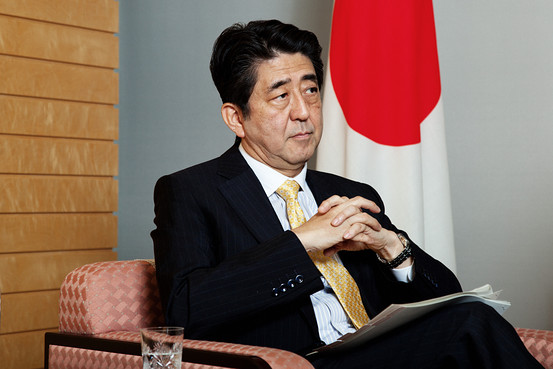Japan’s Prime Minister Shinzo Abe Faces a Crucial Test on Security
The original article was published in the Boston Globe.
 Seventy years after the end of World War II, Japan’s Prime Minister Shinzo Abe has staked his legacy on transforming the country into a “normal state.” By that, Abe and his political allies mean it’s abnormal for Japan to continue to be constrained by its constitution, especially Article 9 — the clause that renounces war. Since Japan’s constitution was enacted in 1947, following the nation’s defeat in World War II, it has been prohibited from the use of force to settle disputes — with the exception of self-defense.
Seventy years after the end of World War II, Japan’s Prime Minister Shinzo Abe has staked his legacy on transforming the country into a “normal state.” By that, Abe and his political allies mean it’s abnormal for Japan to continue to be constrained by its constitution, especially Article 9 — the clause that renounces war. Since Japan’s constitution was enacted in 1947, following the nation’s defeat in World War II, it has been prohibited from the use of force to settle disputes — with the exception of self-defense.
Proposed changes in Japanese law, currently being debated in its Upper House, hinge on the contentious issue of whether Japan has the right to defend its allies and close partners against mutual threats. A vote is likely by the end of September.
Abe has argued that Tokyo should play a proactive role both on national defense and through a greater contribution to regional security.
If the legislation passes, Japan would be able to assist the United States, or other close partners, in the event of circumstances that pose a direct and dire threat to Japan’s national security. The most commonly cited example of such an instance would be a North Korean missile over Japanese territory that is aimed at a US ship. Under current law, Japan would be prohibited from intercepting the missile.
While supported by many in the United States and in Abe’s ruling Liberal Democratic Party, this proposed legislation has been sharply criticized by Japan’s opposition parties and legal scholars, who question whether the changes are consistent with the constitution. The security push is also unpopular with the public — most polls have indicated that more than half disapprove. The Japanese are largely reluctant to make changes on the security front, especially if they involve the Constitution.
Until recently, Japan’s pacifist, post-war constitution has been an untouchable barrier.
Abe has also suffered personally in the polls. His approval rating has plummeted from a high of 74 percent in 2013 to a low of about 37 percent now.
If there’s a silver lining in all this for Abe — who was elected in 2012 and would not be forced to call an election until next year — it’s that the opposition hasn’t been able to gain much traction. But even this may not be enough to save him. He is also mired in other troubles — including cost overruns and planning problems with the Tokyo 2020 Olympics, lingering questions on the economy, and public skepticism over his revisionist approach to Japan’s historical role in World War II. Abe has drawn the ire of Japan’s neighbors — mainly China and South Korea — by questioning the traditional narrative of Tokyo’s use of aggression during the war. Abe also stoked tensions with Seoul and Beijing by visiting the controversial Yasukuni Shrine, a memorial dedicated to Japan’s war dead, in late 2013.
This fluid situation presents important challenges for the United States and its relationship with Japan. First, the passage of the security bills is a critical follow-up to newly revised US-Japan defense guidelines released in April during Abe’s visit to the US. Washington has been looking to Japan as the cornerstone to its Asia “rebalance,” a policy shift that depends on Tokyo taking a greater role in the region’s security.
But Abe’s dwindling political capital also provides opportunities for the US. Despite Washington’s support for the current legislation, a weakened Japanese prime minister will have to be more pragmatic on important issues such as Japan’s relations with regional neighbors. To pump up his approval ratings, Abe could look to score diplomatic coups by repairing ties with China, Russia, and even Korea.
Moreover, public distrust of the Abe government is heightening domestic pressure for a more conciliatory tone on historical issues just ahead of Abe’s anticipated Aug. 15 statement to commemorate the 70th anniversary of Japan’s surrender in World War II.
Shortly after his election, Abe visited the US and declared that “Japan is back.” During that trip, and on other occasions since, he has stressed his administration’s commitment to elevate Japan’s role and contribution to global peace and security in unison with the US.
Passage of the legislation now being discussed will do that, but Abe must also be more tolerant of debate and criticism, and keep his personal views on Japanese history to himself.
Related posts:
Category: FOREIGN POLICY & SECURITY, POLITICS, REGIONS, SOUTH ASIA & ASIA PACIFIC

